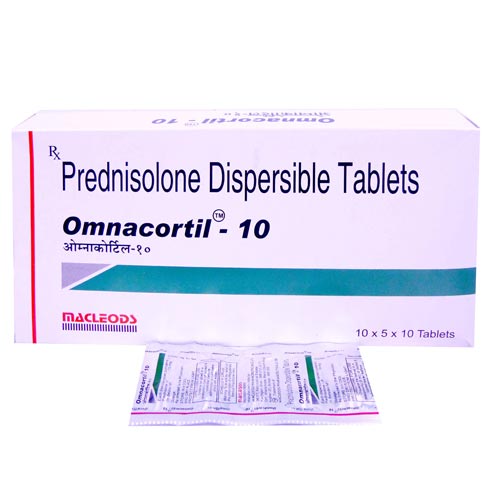Description
Prednisolone is a glucocorticoid with the general properties of the corticosteroids. It is the drug of choice for all conditions in which routine systemic corticosteroid therapy is indicated, except adrenal deficiency states.
Prednisolone is used for the treatment of primary or secondary adrenocortical insufficiency, such as congenital adrenal hyperplasia, thyroiditis. Also used to treat psoriatic arthritis, rheumatoid arthritis, ankylosing spondylitis, bursitis, acute gouty arthritis and epicondylitis.
Also indicated for treatment of systemic lupus erythematosus, pemphigus and acute rhematic carditis. Can be used in the treatment of leukemias, lymphomas, thrombocytopenia purpura and autoimmune hemolytic anemia.
Can be used to treat celiac disease, insulin resistance, ulcerative colitis and liver disorders.
Prednisolone may also be used for purposes not listed in this medication guide.
Pharmacodynamics
Prednisolone is a synthetic glucocorticoid used as antiinflammatory or immunosuppressive agent.
Prednisolone is indicated in the treatment of various conditions, including congenital adrenal hyperplasia, psoriatic arthritis, systemic lupus erythematosus, bullous dermatitis herpetiformis, seasonal or perennial allergic rhinitis, allergic corneal marginal ulcers, symptomatic sarcoidosis, idiopathic thrombocytopenic purpura in adults, leukemias and lymphomas in adults, and ulcerative colitis.
Glucocorticoids are adrenocortical steroids and cause profound and varied metabolic effects. In addition, they modify the body’s immune responses to diverse stimuli.
Mechanism of action
Glucocorticoids such as Prednisolone can inhibit leukocyte infiltration at the site of inflammation, interfere with mediators of inflammatory response, and suppress humoral immune responses. The antiinflammatory actions of glucocorticoids are thought to involve phospholipase A2 inhibitory proteins, lipocortins, which control the biosynthesis of potent mediators of inflammation such as prostaglandins and leukotrienes.
Prednisolone reduces inflammatory reaction by limiting the capillary dilatation and permeability of the vascular structures. These compounds restrict the accumulation of polymorphonuclear leukocytes and macrophages and reduce the release of vasoactive kinins. Recent research suggests that corticosteroids may inhibit the release of arachidonic acid from phospholipids, thereby reducing the formation of prostaglandins. Prednisolone is a glucocorticoid receptor agonist.
On binding, the corticoreceptor-ligand complex translocates itself into the cell nucleus, where it binds to many glucocorticoid response elements (GRE) in the promoter region of the target genes. The DNA bound receptor then interacts with basic transcription factors, causing an increase or decrease in expression of specific target genes, including suppression of IL2 (interleukin 2) expression.
Side effects
All medicines may cause side effects, but many people have no, or minor, side effects.Some medical conditions may interact with Prednisolone.
Tell your doctor or pharmacist if you have any medical conditions.
Common side effects may include: fluid retention (swelling in your hands or ankles), dizziness, spinning sensation, changes in your menstrual periods, headache, muscle pain or weakness or stomach discomfort, bloating.
This is not a complete list of all side effects that may occur. If you have questions about side effects, contact your health care provider.


Reviews
There are no reviews yet.